Learn how to modify mysql table fields in one minute
We know that the ddl statement not only has the function of creating and deleting databases and creating and deleting tables, but also the function of modifying created tables. The example code in the article is very helpful for learning or review by workers. Let’s follow the editor to read it. Look at the ddl statement.

Before studying this article, you must first create a database and several tables (one table is also acceptable). Before opening the article, I created a database called student and the data table of stu. All the following operations are based on this table. You can look at the data in the stu table for comparison in subsequent operations.
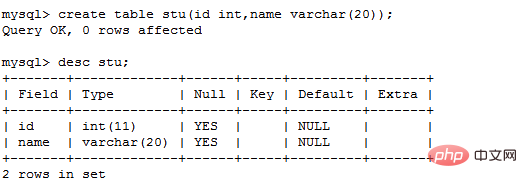
Modify table field type
Syntax:
alter table 表名 modify [colimn] 字段定义 [first|after字段名];
Table name: refers to the name of the data table we need to modify, such as the stu in this article
Field definition: refers to the field name and field type we need to modify
Example:
mysql> alter table stu modify column name char;
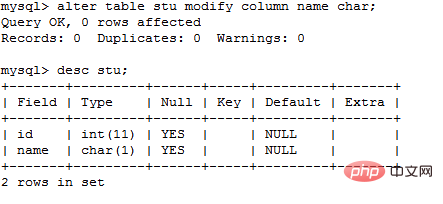
In this way, the name field in the stu table can be modified to char type.
Add table fields
Syntax:
alter table 表名 add [colimn] 字段定义 [first|after字段名];
Example:
mysql> alter table stu add column sex int;
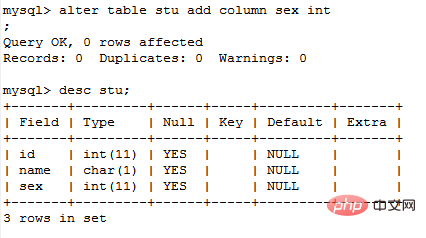
After executing the above statement, when we use desc to view the form, we find that there is an additional sex field, indicating that we have successfully added the field.
Delete table fields
Syntax:
alter table 表名 drop [colimn] 字段名;
Example:
mysql> alter table stu drop sex;
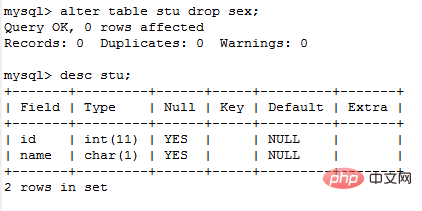
We can see that the field we just added has now been deleted, and there is no sex field.
Field rename
Syntax:
alter table 表名 change [colimn] 旧的字段名 字段定义 [first|after字段名];
Example:
mysql> alter table stu change name mingzi char;
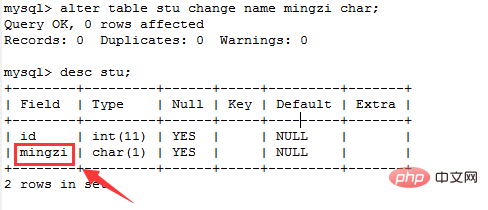
This way you can The original name field is renamed mingzi. If you don’t want to modify the field name but want to modify the field type, you can also use this method
mysql> alter table stu change mingzi mingzi int;
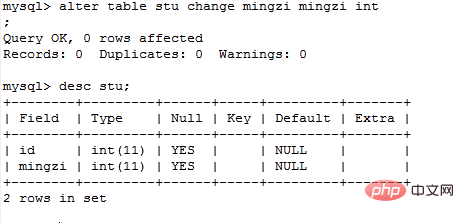
This allows you to modify the field type without modifying the field name.
Note: Both change and modify can modify the definition of the table. The difference is that change needs to be followed by two column names. , not particularly convenient, the advantage is that change can modify the field name.
Modify the field arrangement and sorting
[first|after field name]This selection can be used to modify the position of the field in the table. Add a new The field is loaded at the last position in the table by default, and change/modify does not change the field position by default.
Note: change/first|after field name These keywords belong to the extension of mysql on standard sql, and on other databases Not necessarily applicable.
Change table name
Syntax:
alter table 表名 rename [to] 新的表名;
Example:
mysql> alter table stu rename students;
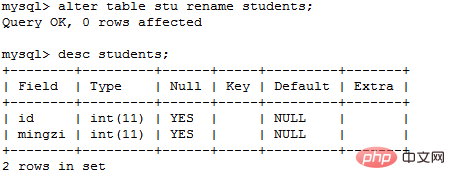
In this way we can modify the name of the data table.
Recommended tutorial: mysql video tutorial
The above is the detailed content of Learn how to modify mysql table fields in one minute. For more information, please follow other related articles on the PHP Chinese website!

Hot AI Tools

Undresser.AI Undress
AI-powered app for creating realistic nude photos

AI Clothes Remover
Online AI tool for removing clothes from photos.

Undress AI Tool
Undress images for free

Clothoff.io
AI clothes remover

Video Face Swap
Swap faces in any video effortlessly with our completely free AI face swap tool!

Hot Article

Hot Tools

Notepad++7.3.1
Easy-to-use and free code editor

SublimeText3 Chinese version
Chinese version, very easy to use

Zend Studio 13.0.1
Powerful PHP integrated development environment

Dreamweaver CS6
Visual web development tools

SublimeText3 Mac version
God-level code editing software (SublimeText3)

Hot Topics
 1653
1653
 14
14
 1413
1413
 52
52
 1306
1306
 25
25
 1251
1251
 29
29
 1224
1224
 24
24
 MySQL's Role: Databases in Web Applications
Apr 17, 2025 am 12:23 AM
MySQL's Role: Databases in Web Applications
Apr 17, 2025 am 12:23 AM
The main role of MySQL in web applications is to store and manage data. 1.MySQL efficiently processes user information, product catalogs, transaction records and other data. 2. Through SQL query, developers can extract information from the database to generate dynamic content. 3.MySQL works based on the client-server model to ensure acceptable query speed.
 How to start mysql by docker
Apr 15, 2025 pm 12:09 PM
How to start mysql by docker
Apr 15, 2025 pm 12:09 PM
The process of starting MySQL in Docker consists of the following steps: Pull the MySQL image to create and start the container, set the root user password, and map the port verification connection Create the database and the user grants all permissions to the database
 Laravel Introduction Example
Apr 18, 2025 pm 12:45 PM
Laravel Introduction Example
Apr 18, 2025 pm 12:45 PM
Laravel is a PHP framework for easy building of web applications. It provides a range of powerful features including: Installation: Install the Laravel CLI globally with Composer and create applications in the project directory. Routing: Define the relationship between the URL and the handler in routes/web.php. View: Create a view in resources/views to render the application's interface. Database Integration: Provides out-of-the-box integration with databases such as MySQL and uses migration to create and modify tables. Model and Controller: The model represents the database entity and the controller processes HTTP requests.
 Solve database connection problem: a practical case of using minii/db library
Apr 18, 2025 am 07:09 AM
Solve database connection problem: a practical case of using minii/db library
Apr 18, 2025 am 07:09 AM
I encountered a tricky problem when developing a small application: the need to quickly integrate a lightweight database operation library. After trying multiple libraries, I found that they either have too much functionality or are not very compatible. Eventually, I found minii/db, a simplified version based on Yii2 that solved my problem perfectly.
 Laravel framework installation method
Apr 18, 2025 pm 12:54 PM
Laravel framework installation method
Apr 18, 2025 pm 12:54 PM
Article summary: This article provides detailed step-by-step instructions to guide readers on how to easily install the Laravel framework. Laravel is a powerful PHP framework that speeds up the development process of web applications. This tutorial covers the installation process from system requirements to configuring databases and setting up routing. By following these steps, readers can quickly and efficiently lay a solid foundation for their Laravel project.
 How to install mysql in centos7
Apr 14, 2025 pm 08:30 PM
How to install mysql in centos7
Apr 14, 2025 pm 08:30 PM
The key to installing MySQL elegantly is to add the official MySQL repository. The specific steps are as follows: Download the MySQL official GPG key to prevent phishing attacks. Add MySQL repository file: rpm -Uvh https://dev.mysql.com/get/mysql80-community-release-el7-3.noarch.rpm Update yum repository cache: yum update installation MySQL: yum install mysql-server startup MySQL service: systemctl start mysqld set up booting
 MySQL and phpMyAdmin: Core Features and Functions
Apr 22, 2025 am 12:12 AM
MySQL and phpMyAdmin: Core Features and Functions
Apr 22, 2025 am 12:12 AM
MySQL and phpMyAdmin are powerful database management tools. 1) MySQL is used to create databases and tables, and to execute DML and SQL queries. 2) phpMyAdmin provides an intuitive interface for database management, table structure management, data operations and user permission management.
 MySQL vs. Other Databases: Comparing the Options
Apr 15, 2025 am 12:08 AM
MySQL vs. Other Databases: Comparing the Options
Apr 15, 2025 am 12:08 AM
MySQL is suitable for web applications and content management systems and is popular for its open source, high performance and ease of use. 1) Compared with PostgreSQL, MySQL performs better in simple queries and high concurrent read operations. 2) Compared with Oracle, MySQL is more popular among small and medium-sized enterprises because of its open source and low cost. 3) Compared with Microsoft SQL Server, MySQL is more suitable for cross-platform applications. 4) Unlike MongoDB, MySQL is more suitable for structured data and transaction processing.




